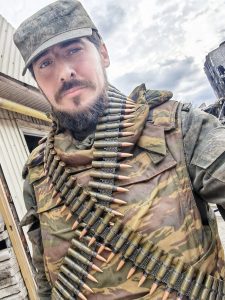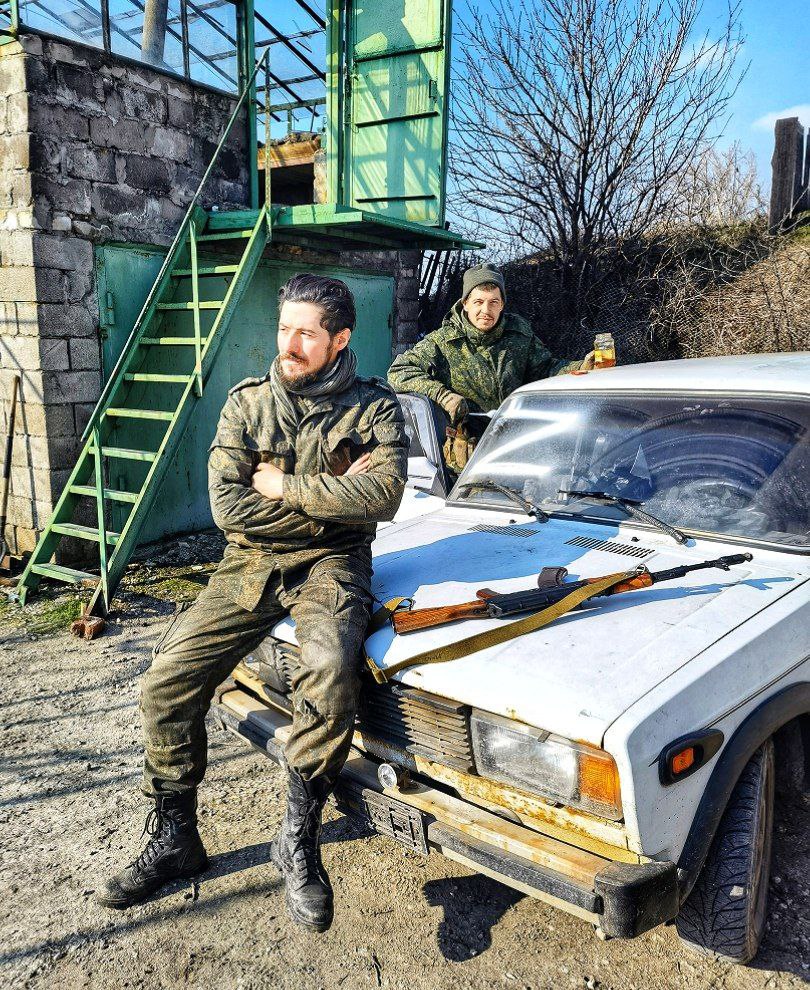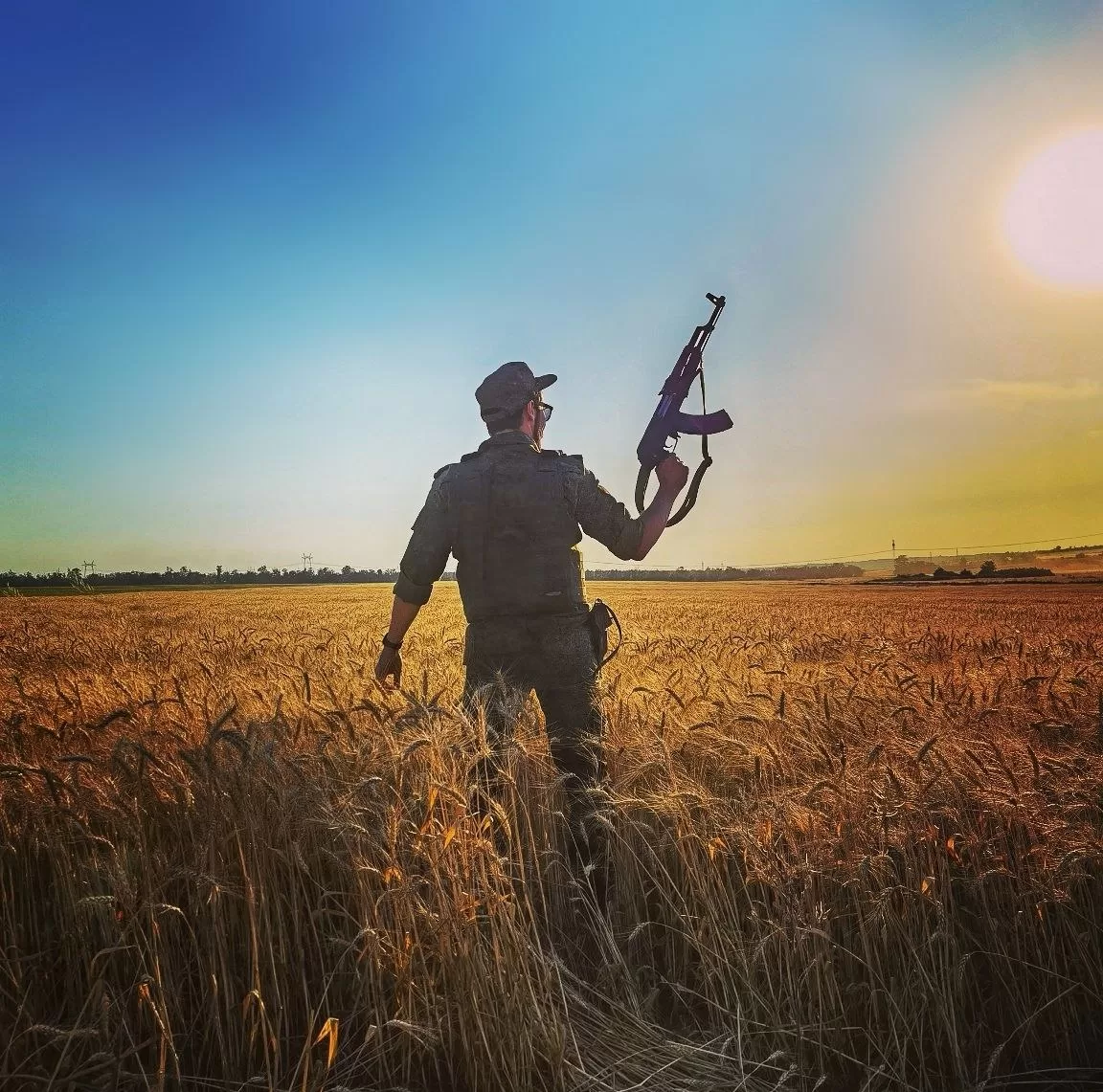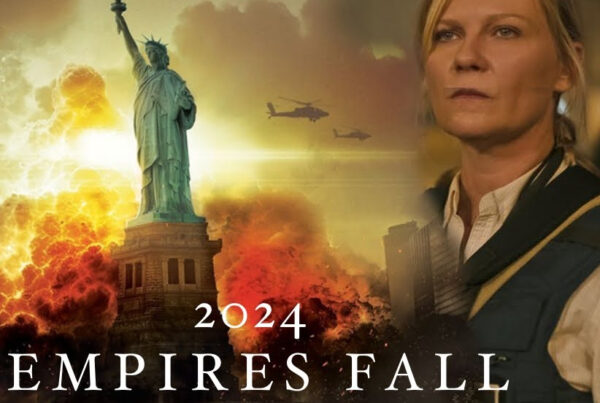“… et Thybrim multo spumantem sanguine cerno.”
– Virgil

Eight Years Later
October 15, 2022
This time it was the real deal, the full-blown, the ultimate. War on all fronts. Explosions were everywhere. Buildings echoed with the sound of cannons, shots were fired and received, all in the city center, on the outskirts, at the back, and at the front. It was more intense than ever before. A massacre. So many had died, yet many still died, and there were still those willing to die. Miraculously, K. was not dead. Neither was R. It wasn’t for lack of trying to meet death, though, in Mariupol, in Yasnuvataya, in front of Zaporozhye. Death was everywhere, all the time. Death wet its lips in the cup of the cities. It drank greedily, never getting full. Only Vladimir could put an end to all of this. But to end all of this, one had to walk to Kiev. So they walked… For now, they were by the flowered pubs on Tchelyuskintsev Street. The day before, a 155mm shell had struck a bus. Six dead, and many wounded. A saleswoman had received a large shrapnel to the head, the rest were the bus passengers, torn apart, burned. Such a tragedy. There’s a nice café, amid flower pots, chrysanthemums, and peonies. An unpretentious joint… it sprawls onto the public road, no one bothers it, with stools, a bench made of pallet slats, and a small table. They settle there. They know that beautiful women pass by, and the women are not stingy about swaying their hips. So they sit. Two Americanos, please. They arrive a bit later, and they begin to recount the war. It’s K. who starts.
— So, he doesn’t answer me, he’s completely drunk. I punch him. It’s the first time anyone dared do that to me, he says. He stands up to hit me, I land him a second punch. It sends him back into his chair. Where’s the booze? I ask him again. Under the arches, a sniper could have easily taken out both of us. But the exhausted Ukrainians were probably asleep. Or perhaps they were too eager to watch the drama through binoculars. Send me to the front line, he tells me the next day. I say, okay. Except it was in a roofless house, and it rained all night. He didn’t want his duty anymore… He wanted to come back… They didn’t even have a covered tent, their backsides stuck to the clay, a tarp over their faces, drowned in the dampness…
— You have to do everything for them, tell them everything.
— Sometimes, yes.
— Not sometimes. All-the-time.
— Ah, those are your little ones, that’s both the good and bad side of things, they’re all ears, they await your word…
— It’s like daycare, yes. A daycare for adults.
— Who die and then fight, or the other way around, I’m not quite sure anymore. We try to protect them, but it’s stronger than them, they have this self-destructive instinct… Alcohol, driving, smoking, risky jobs, digging a tunnel eight hundred meters underground, melting metals at eight thousand degrees, etc.
— Maybe that’s bravery?
— Maybe. It’s a funny word to describe a false form of boldness. And then, some aren’t exactly daredevils. There are even some who want to live! It’s better to destroy oneself slowly.
The rolling balls… Where was I? They test the darkness with the tips of their lips… It’s still a bit hot. Ivory islets float on its surface, but closer to the edge, circular, like a Cyclades archipelago.
— Shall we move?
— Later, it’s no wonder I was promoted to starshina in three months. Come on, let’s go.
We take our cups, leave a hundred bill. We’re not savages, after all. We move around in civilian clothes, even if it’s evident that we’ve been in fights, and that we enjoy it. They passed the alley that led down to the market. The DPR [Donezk People’s Republic] flag fluttered over the dome with portholes, all in turquoise tiles pierced with glass. Inside, there were beautiful Greco-Soviet mosaics, a testament to the carefree naivety of the post-red war era. They had their own “Thirty Glorious Years,” the blessed time of Leonid Brezhnev. Forty years of economic gloom couldn’t erase the memory. Deep down, I think people yearn to return to that time. However, they’ve forgotten the way since that damned Gorbachev. They weave between two rows of bistros, some empty due to a lack of clientele, others stubbornly trying to survive… It’s tough being a small business owner. And then, if you succeed, you become the big fish that devours the others… They reached Chevtchenko Boulevard, which can be crossed in two stages. A generous promenade separates the opposite directions of traffic, a relic of Soviet urbanism, yet again. A city model was used as a template during the 1936 World Expo (the famous one in Paris), with the communist and Nazi pavilions facing each other. We know so little about history. Birch trees swayed on either side, level with the Stalinist-style buildings. To the left was a department of the business school, the only slightly austere building next to the student accommodation. They walked a little further, across the tram tracks, the Nikolsky is on the corner with its large hexagonal turret, some unpretentious stained glass, and balconies with bundled wrought ironwork. They take Teatralnaya Street, which rises sharply towards the opera house. The air whistled. It was a salvo of Grad missiles taking off, probably around the stadium. This part of Teatralnaya was a spectacle. The barricaded cafés, tattoo parlors with closed shutters, old sickle ornaments falling from facades… What a setting. Ragweed grew up to hip height, chaos sprung up between the cobblestones, and the cobblestones rose over each other. If you’re not careful, you’d sprain an ankle.
— At least it’s quiet when you live here.
— Except when bombs fall.
They were falling a bit further away at the moment. Bombs produce a metallic hum when they fall, especially on a hard surface. In contrast, they make a very round sound coming out of the cannon. That’s how a civilian ear differentiates. The rumor is that French calibers are hitting the city. It’s probably true. Here they are at the crossroads of Teatralnaya and Artema, in front of the opera. The signboard awaits the start of the season that keeps getting postponed… Artists are advised to stay home and check in once a month. Some have already left for other horizons, just as Russian, further north, northeast… The cannons have ultimately silenced voices and pianos. What a situation. They cross when the pedestrian light turns green. There’s traffic; it’s the former main line, the main artery. Once, streets were still numbered like in Manhattan. Without that, people count each other manually. People are afraid to walk, whereas the car and speed give the driver a feeling of invulnerability. So, they continue up the street, pass by the tank on its pedestal, a T-34 that belonged to Grinkievitch. He liberated the city with his brigade. This leads them to Pushkin Boulevard, also split with a central promenade. They turn left. There are a few stores with poetic names, Dijon, Buon Café, DiVino, and then the Happy Life. That’s where they have their meeting, on the terrace. Otherwise, the place is underground with dim purple neon lights and whitish LEDs under the seats. They were meeting a minister, in the flesh. An old buddy from 2015 when he wasn’t so high up. He looked sharp, a villain face like in spy movies. It’s late morning, still not crowded. There’s a man alone seated in the far corner. It’s him; he’s recognizable, his table reserved any time of the day, seven days a week. The table is already well set, Dorian ordered a beer and two sushi platters he barely touched. He gets them a place setting. K. and R. each order a lemonade without ice. They take a while to arrive. They then discuss their ongoing business. D. hands them a handwritten coded note and then a cardholder. It’s the belongings of an ukrop [a Ukrainian, from the Russian word for “dill” — ed.] killed at Azovstal, a young lad from Azov. He had Privat Bank Gold cards, multiple. So, hackers got to work. Every bit counts. Especially when you’re picking the pockets of a deceased rat. With chopsticks, K. and R. fiddled with wasabi in the bland sauce container always served with Japanese dishes. The terrace was designed in reassuring ebony tones. The sofas were probably the best in town. Hard to get up and be productive elsewhere. Meanwhile, every bistro was cutting corners, merely practical to keep menu prices from skyrocketing. Misting systems, for example, were turned off. Honestly, there was hardly anyone left to work, fight, or consume. Hard to live in a country with a declining population for thirty years. Here come the lemonades, served by the best. DiVino had closed after the twenty-fourth, so the waiter found a job here at Happy Life. He was too distinctive for anyone to turn him down, a lookalike of Maurice Risch, but fifty kilos heavier, increasing the endearing comedic effect. Michonnet! Michonnet! They would have loved to shout. He wouldn’t have understood.
— Guys, we only finished pacifying Chechnya in 2012; and Chechnya isn’t big… Four years for Syria, and it’s not entirely over… Palmyra, captured and lost, then recaptured… Without wanting to offend our friends from the Caucasus and Arabia, today we face a much more serious opponent… They had time to prepare… They spent eight years doubling their efforts, correcting their mistakes, educating themselves, equipping, training in the American style. They put all their budget into and for the war.
— Minsk gave them a chance to breathe when we could have wiped them out in the winter of 2015… Some say it’s our fault. We should have pressed on.
— Russia wasn’t ready, period. Sanctions and all that… It doesn’t concern you too much; you fight your war, your little affairs, but the economy… The lives of millions of people who didn’t ask for anything, who don’t have the mindset of knights… They too cast their little vote every six years, and their voice counts as much as yours.
— They’re selfish, period. Self-centered. Now, because of them, it’s a bloodbath, which we could have prevented eight years earlier. We just shouldn’t have stopped.
— Take, for instance, Enoch Powell’s “Rivers of Blood,” who remembers that? Here, we predicted the rivers in 1991; wise priests advised those with fragile nerves to seek refuge. Where is a matter of foresight and personal interests. Walk around in Bavaria; it’s practically half-Russian speaking today.
— And the other half is Turkish.
— The only question is, how long will it bleed?
— Is it a new Hundred Years’ War?
— Already a new Thirty Years’ War, let’s not push things.
— The Second Thirty Years’ War, sounds good, doesn’t it?
— It will be well-suited for history books.
— Too Franco-British, too Eurocentric.
— We’ll call it the Second Great Patriotic War because it’s about the survival of Holy Russia, my friends.
— We know that all too well. Prigozhin says it’s going to last ten years.
— He’s probably right. And that the conflict will spread, igniting other regions.
— So, we’re just at the beginning!
Charmed by the irony of his reflection, R… leaned back deep into the sofa. He put his hands behind his neck and for a moment contemplated the vast trials that time would serve them, as if on a platter.
— And who will remain in the end?
— Us.
They laughed between bites of sushi.
— Guys, you ask too many questions and you tend to scatter. We’re not in a bar sketching out the world here. Either we shape the world or we sit down, watch and stay quiet. French dialectics have scrambled your brains.
— There’s some truth to that… Admit it’s good though? To speculate, weigh ideas, hypotheses…
— We came here to reeducate ourselves, after all! We needed the right place for it… No matter the detours fate takes… And if things go badly in this life, then everything will be fine up there, in the Lord’s.
On that note, they parted ways. K. and R. retraced their steps, hands in their pockets, glasses perched on their noses even as they headed due north. After the opera, there’s a sandbox, but children no longer play outside, and the storefronts on the ground floors of neighboring buildings have shattered. Only the barber’s shop, among all the signs, dares to be open. The glass on this row of old shops is so thick, of such good quality, that the corners and edges have remained embedded in the structure, between two rows of bricks. They serve as a veil around the plywood panels installed from the inside to insulate and seal the opening, on which notable scenes from the start of this renewed war have been spray-painted. Especially the Soviet granny… It’s said that the ukrops forced her to record a video for Soros’s TVs… The USSR isn’t Putin, the USSR is peace and little cooing doves, like the clown in Kiev… Well, the Nazi officer still trampled on her flag in the mud last March… anyway, let’s move on. Mistreating the elderly, that’s nothing new. They arrived in front of the white house, the former administration building, of which it’s unclear what’s inside now… yes, there’s the assembly, and the Ministry of Sports too… It proudly faces Chevtchenko Boulevard, which stretches straight for miles, and where the statue still hasn’t been toppled… Some would like to replace it with one of Stalin. There’s the fine arts museum on the corner, with its home-made gilding on the pediment, and its door sanded, polished, and waxed with noticeable care. There were always cops taking a smoke break in front of the institute. And then, for once, one notices a white van parked haphazardly right on the sidewalk. In the front, on the driver’s seat, there’s a hefty man with folds, dozing off, and in the back, a skinny guy tapping away on his screen gadget. They walk by without paying it any further attention.
— Young men, young men, a moment please!
They turned around; it was the skinny guy from the back of the van.
— Can I see your IDs, please?
Sure, they said to him. He wore the armband of the military police. A desk jockey. He barely had time to flip through K.’s booklet when his buddy showed up from across the street.
— Leave them be, it’s fine. I know him; he’s the Frenchman. He fights.
It was true. They knew how to preserve themselves and make rational decisions. But they had strayed too far from their paths since 2016. Each was in his battalion. One was in the 1117, the other in the Redoubt—go figure. They were somewhat secretive things. Soldiers have their lingo. So, the other guy just handed back their IDs without a word. K. and R. were too old to express disdain. It’s better to offer indifference. Towards the weak by choice, in body and mind, to the cowards, the shirkers, the deserters, the loudmouths, the whiners, the backstabbers, and so on, as many as there are. May God have mercy on their beaten souls. Speaking of Him, they had an appointment with Him…
They headed towards a chapel attended by few. The best ones always are. They could glimpse its dome and spire purposely jutting out above the roofs of the Stalinist buildings. God loves intimacy and simplicity. They walked past the old Berkut and Oplot neighborhoods, now cleared. Pushkina 2, Pushkina 4, legendary offices from the early days. Counter-Maidan, civilizational victory. Everything started right here. They remained there late under Pushilin, but at some point, it was time to become respectable, to remove the barricades and the pierced barrels. The filmmakers’ house took their place. It left one indifferent. They reached the end of Pushkina, where the new Olivier 80 is located. They cross a dual carriageway with double white lines on Khmelnitsky. It’s quite busy, but the red lights create gaps in the traffic flow, otherwise, they’d look for a pedestrian crossing. Slipping between two freshly repainted Stalinist buildings on the street side, they enter the courtyard of a large block of buildings whose epicenter is a wasteland barricaded by sheets. It’s a skyscraper construction site started in 2014. They only had time to dig the foundations. The alley was covered with leaning linden trees reminiscent of a bower. Further on, faded facades recalled the successive colors applied to buildings under each new party secretary… ochre, then chlorophyll green, then orange… post-Sovietism slowly rose to the prestige of decadent romanticism, this possibility of infinite love for ruins… Once those of Christianity, today those of industry. Concrete too knows how to age; it’s about appreciating it. Add to that fluted pilasters, crumbling volutes, half-collapsed pediments, nibbled by lichen, and this whole place took on the air of a modern Acropolis. The courtyard turned into a narrow passageway, leading to the back of the chapel. The crypt was fortified, sealed by piles of sandbags stacked against each opening (there were three). Facing the crypt, but placed side-on, a war memorial dedicated to those of ‘45, specifically to killed students and teachers, forced one to detour around a path made of thin concrete slats, which undulated due to the growth of poplar trees around. And then the third study hall of the technical academy, a temple to mechanical engineering with huge columns. However, the entire right side of the alleyway, covered by the study institute, about a hundred meters long and three stories high, displayed endless rows of windows, all blown out from some explosion. The two boys noticed that the monument was pockmarked on one side, chipped, covered with bomb splinter impacts, with the crater just a couple of meters away, closer to the chapel. Strangely, it was preserved while the surroundings had suffered. They walked between the two buildings, one ruined with gaping openings, and the other, pristine. The angels had chosen to make a demonstration here. Other churches had suffered damage, up to the Iversky one and its monastery, completely disfigured… But here, the Holy Spirit had decided to draw a clear distinction between brute force, matter; and faith. Shell fragments never fly by mere chance.
They crossed themselves at the gateway. They bent at a right angle, but without touching the asphalt with their index finger, which can sometimes seem like an exaggerated zeal. They moved forward and climbed the steps, crossing themselves again. They pushed half of a carved oak gate and directly entered beneath the nave. They had promised to light candles in memory of their fallen friends. And there were many, believe me. They approached the usual booth and took several hundred rubles’ worth, so many that the candles could hardly fit in their hands. They only took the thickest and longest ones. The nun, dressed in a blue shroud, the color of a virgin, blessed them with a gaze, as only old people full of pain and contrition can do. Her hawkish eyes, through thin glasses, approved with the host of cherubim above, their desire for contemplation. They crossed themselves again, bowed to the marble under their feet, with its cryptic geometric patterns. Silence was mandatory. No choir, no believers, nothing from outside, disturbed their moment of elevation. They found, to their right, in the corner that shelters her, on her stand, a Virgin Mary with a child which they kissed. And then, on the candelabra, bordered by a gonfalon, they lit the candles one by one, using the flame from those already burning. They then whispered a prayer and a Pater Noster, while burning the base of the candle, which they then fixed onto a spike. And then, onto the next. K. and R. made the sign of the cross for a long time, and many times. Their palms vibrated with a gentle exaltation, which spread to their forearms before they finished. They left in silence, filled with emotion and reflection.
The horizon echoed with the sounds of artillery, like an orchestra drum announcing a climax. That was enough for today. R. still had to go back to M.Ch. to see his wife and child. K. had some Granados, Verdi, and Bach to listen to.
— Will you accompany me to the station?
— Sure.
They almost retraced their steps, the florists and the dome, the stalls, the trestles, empty and less empty, the soldiers and the disabled, the beggars in extremis, the young girls in skirts, weighed down by a stupefying summer.
— So, I emptied the jars, and the big bottle through the opening. I even took the time to let them drain! Twenty-five liters of booze, can you imagine! Right in front of the ukrops, yeah. At least they won’t get their hands on it…
— Shame they don’t award you the Saint George for that, huh?
— It’s practically a combat move! And a public health service, that’s for sure!
Donetsk-Shakhtiorsk, that’s forty-five minutes, forty-five kilometers, and forty-five rubles. And then a small eighteen-seat bus, a PAZ, to take on the crossroad towards Amvriosiefka. The storm is only approaching. Its forerunners have only brushed the steppe. The real challenge will be staying intact until the end.











We’ll call it the Second Great Patriotic War because it’s about the survival of Holy Russia, my friends.
Da….it is Holy, Prigozhin was right,but not how he thinks,the war has been going on for awhile now,Russia isnt first, Syria and Libya were first, how many of us were saying Russias next, Thank you Francois for sacrificing time energy, for writing this.